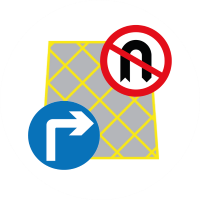Find Key Cases
Browse key cases using the filter for either ‘Contravention type’ OR ‘Issue’. Alternatively, use the ‘Search…’ box to find cases through a custom query.
Cases on the site currently cover parking, bus lane, moving traffic and road user charging, including the London Congestion Charge and Clean Air Zones (outside London). More cases and contravention types will be added in due course.






Please note: All adjudicator decisions included on this website are in the public domain. While they have been curated together here for the convenience and interest of users, any information contained within the decisions remains the responsibility of the original adjudicating body. Any questions relating to the content of cases should also be directed to the adjudicating body.
Mr J – v – Buckinghamshire Council
(PJ00006-2512)
Traffic Penalty Tribunal
Decision Date: 2026-01-02
This case clarifies that the council authority does not need to demonstrate a motorist intended to commit a littering contravention, or that an item was deliberately thrown/dropped or deposited; nor does it need to identify the littered item left behind.
Mr B – v – Calderdale Borough Council
CX00053-2511
Traffic Penalty Tribunal
Decision Date: 2025-12-11
Outcome: Dismissed
This case confirms that a civil enforcement officer is entitled to observe a vehicle within the ten-minute period of grace provided to motorists who have paid to park. The penalty can, however, only be imposed after the grace period has expired.
Additionally, the case clarifies that paying for a virtual parking session through an app is equivalent to displaying a pay-and-display ticket. A penalty charge notice issued for failing to pay and display, therefore, adequately describes the contravention.
Other points addressed in this case include:
- the possibility that more than one contravention code can apply (in this instance, parking after the expiry of paid for time could also apply)
- the principle that other previously determined appeals may be persuasive, but are not binding on an adjudicator
- a caution that case names and appeal numbers sourced on the web should not be relied upon to support an appeal, without providing the full written decision to the Tribunal.
Mr R – v – Birmingham City Council
JJ00311-2508
Traffic Penalty Tribunal
Decision Date: 2025-10-03
Outcome: Dismissed
This case clarifies that liability for the civil penalty can only be transferred to a hirer under a hire agreement that meets the requirements of the Road Traffic (Owner Liability) Regulations 2000.
Mr M – v – Bradford Council
(BQ00186-2508)
Traffic Penalty Tribunal
Decision Date: 2025-09-10
Outcome: Dismissed
This case makes clear that the registered keeper of the vehicle remains liable to the council for the civil littering penalty, even if they themselves did not throw, drop or otherwise deposit the litter.
The case also covers the fact that the council must prove a person throws down, drops or otherwise deposits litter from the vehicle and leaves it on land the council has a duty to keep, so far as is practicable, clear of litter.
Mr M – v – Southampton City Council
(SN00091-2507)
Traffic Penalty Tribunal
Decision Date: 2025-08-07
Outcome: Dismissed
This case clarifies that private hire vehicle (PHV) drivers are not entitled to stop at a bus stop to allow passengers to board or alight. This is a stopping contravention with no period of grace.
